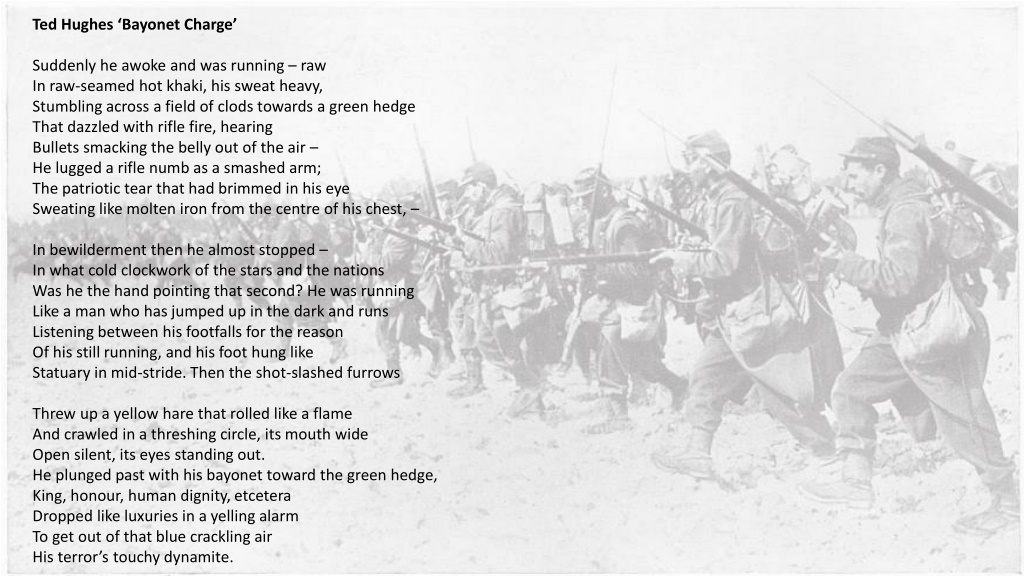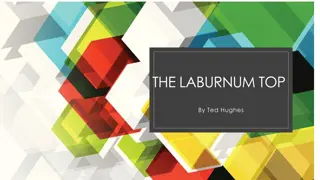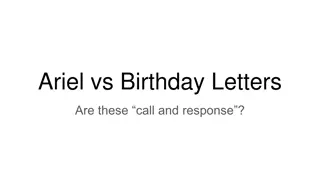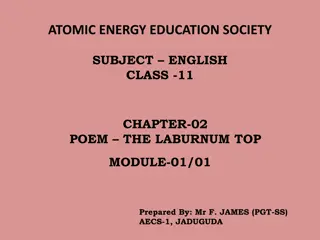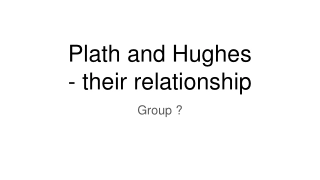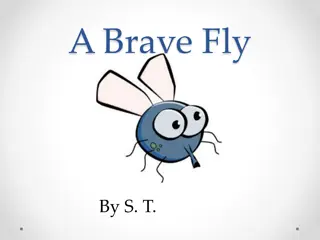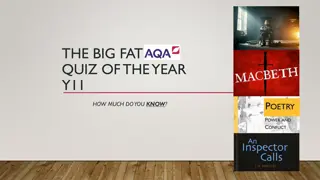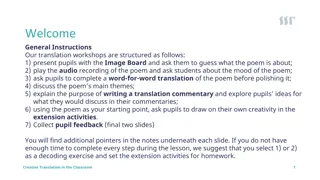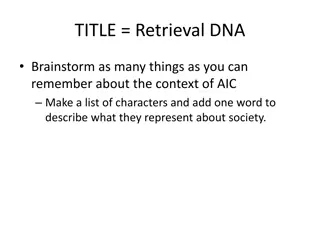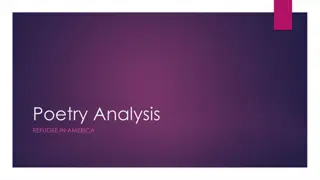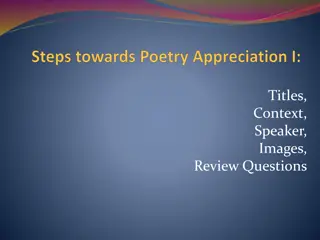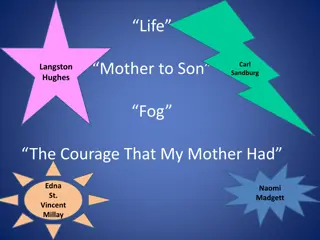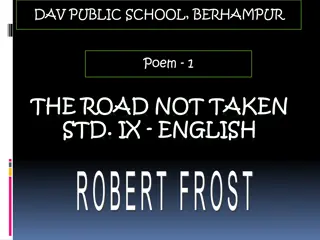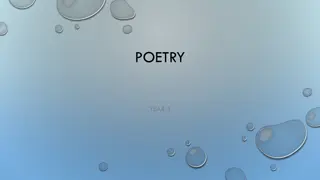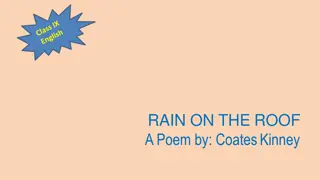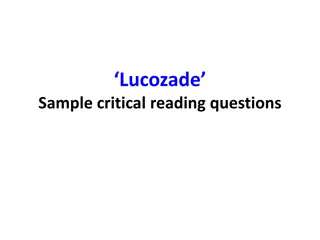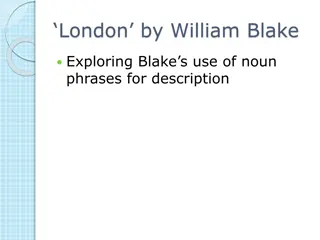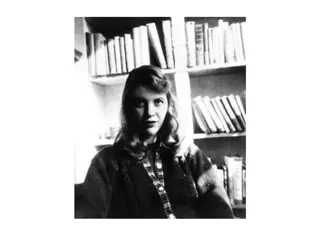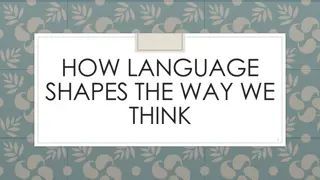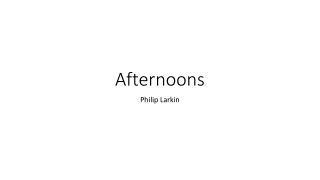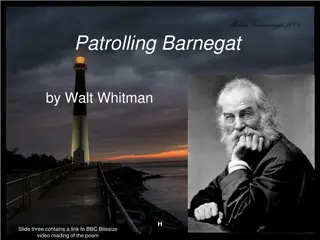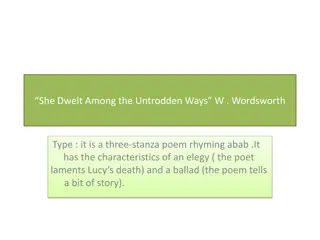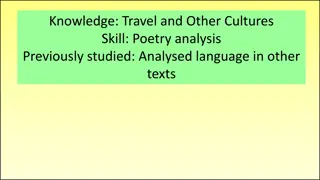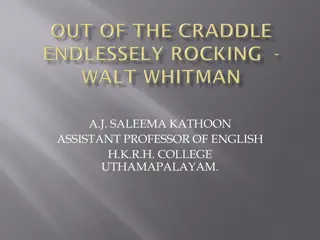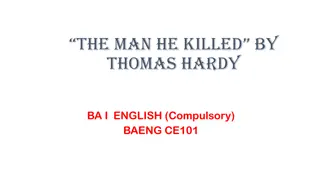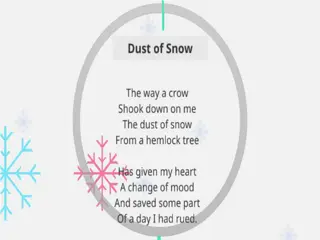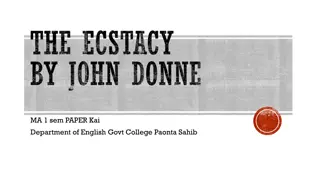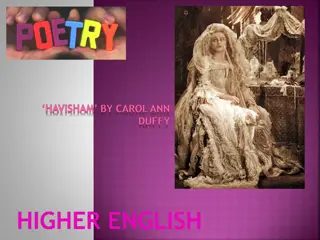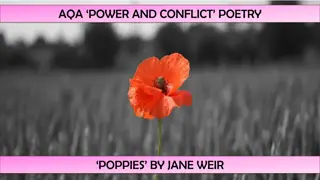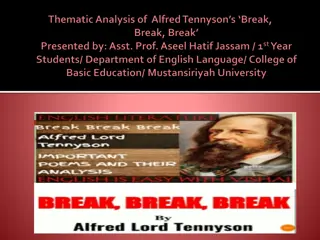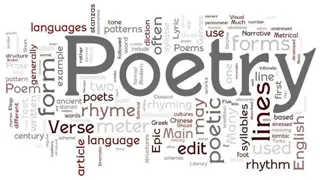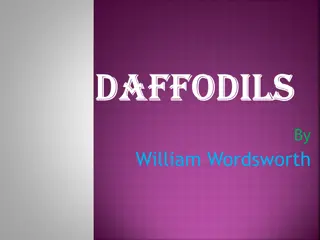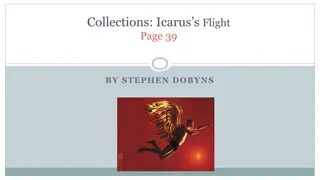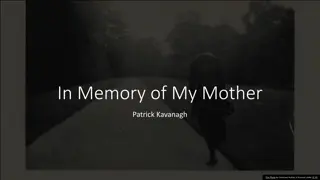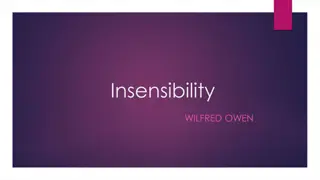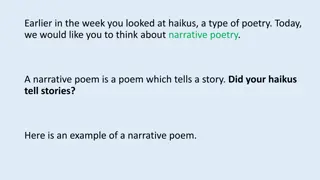Analysis of Ted Hughes' Poem "Bayonet Charge
The poem "Bayonet Charge" by Ted Hughes delves into the chaotic and harrowing experience of a soldier in the midst of battle. The vivid imagery, use of similes and rhetorical questions highlight the confusion, fear, and sense of insignificance felt by the soldier as he navigates the brutal realities of war. Through powerful descriptions and emotive language, Hughes captures the raw and turbulent emotions of a soldier thrust into the brutality of conflict.
Download Presentation

Please find below an Image/Link to download the presentation.
The content on the website is provided AS IS for your information and personal use only. It may not be sold, licensed, or shared on other websites without obtaining consent from the author. Download presentation by click this link. If you encounter any issues during the download, it is possible that the publisher has removed the file from their server.
E N D
Presentation Transcript
Ted Hughes Bayonet Charge Suddenly he awoke and was running raw In raw-seamed hot khaki, his sweat heavy, Stumbling across a field of clods towards a green hedge That dazzled with rifle fire, hearing Bullets smacking the belly out of the air He lugged a rifle numb as a smashed arm; The patriotic tear that had brimmed in his eye Sweating like molten iron from the centre of his chest, In bewilderment then he almost stopped In what cold clockwork of the stars and the nations Was he the hand pointing that second? He was running Like a man who has jumped up in the dark and runs Listening between his footfalls for the reason Of his still running, and his foot hung like Statuary in mid-stride. Then the shot-slashed furrows Threw up a yellow hare that rolled like a flame And crawled in a threshing circle, its mouth wide Open silent, its eyes standing out. He plunged past with his bayonet toward the green hedge, King, honour, human dignity, etcetera Dropped like luxuries in a yelling alarm To get out of that blue crackling air His terror s touchy dynamite.
The poem begins in medias res, highlighting the unpredictable, chaotic and dangerous nature of war. Suddenly he awoke and was running raw In raw-seamed hot khaki, his sweat heavy, The repetition of the word raw could reinforce the soldier s pain, or it could emphasise the soldier s inexperience and lack of preparation.
The verb choices create a sense of action and confusion. The soldier s confusion is emphasised by the use of enjambment. Stumbling across a field of clods towards a green hedge That dazzled with rifle fire, hearing Bullets smacking the belly out of the air
The verb lugged implies it is an effort for the soldier to carry his rifle. This simile suggests that the soldier s rifle seems useless in battle. He lugged a rifle numb as a smashed arm; The patriotic tear that had brimmed in his eye Sweating like molten iron from the centre of his chest, This simile suggests that the soldier s patriotism has been replaced by pain and fear now he has seen the reality of war.
In bewilderment then he almost stopped In what cold clockwork of the stars and the nations Was he the hand pointing that second? This rhetorical question emphasises the soldier s insignificance. He doesn t feel like he is in control of his destiny. The phrase cold clockwork suggests he is part of a machine that is uncaring.
He was running Like a man who has jumped up in the dark and runs Listening between his footfalls for the reason Of his still running, and his foot hung like Statuary in mid-stride.
Then the shot-slashed furrows The hare crawls in a circle which gives the impression it is trapped. Threw up a yellow hare that rolled like a flame And crawled in a threshing circle, its mouth wide Open silent, its eyes standing out.
He plunged past with his bayonet toward the green hedge, King, honour, human dignity, etcetera Dropped like luxuries in a yelling alarm The green hedge is repeated, suggesting the soldier is determined to complete his task.
To get out of that blue crackling air His terror s touchy dynamite.
Compare how poets present the experience of soldiers in Bayonet Charge and one other poem from Power and conflict . Suddenly he awoke The poem begins in medias res to show the chaos of war. The word awoke reminds the reader that this is reality. S raw The word raw is repeated to emphasise the soldier s inexperience. Another interpretation is that the word raw reinforces the pain the soldier is in. P terror s touchy dynamite The soldier s fear is driving him forward. Fear has become a weapon as it could make him act at any moment. L Sweating like molten iron from the centre of his chest This simile suggests that the strength he felt from his patriotism is leaving him and being replaced by pain and fear. I King, honour, human dignity etcetera This list shows the reasons why people go to war. King (or patriotism is first), suggesting it s the most important. However, these are undermined by the etcetera . T
Which poem would you choose to compare to Bayonet Charge ? KEY THEMES: Charge of the Light Brigade Effects of conflict Reality of conflict Fear Individual s experience of conflict Exposure Which poem would make a good comparison? Remains
